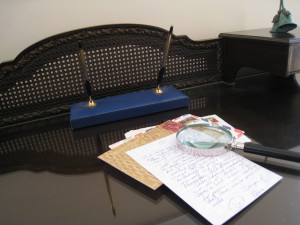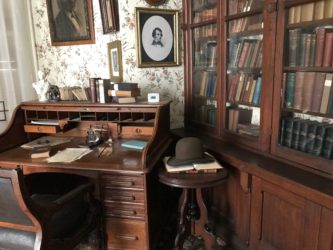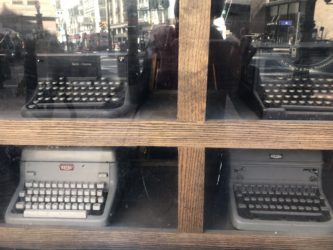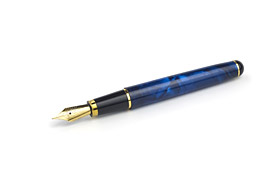From Rob, New York City – Marcia, two aspects related to your blog come to mind: one is the issue of technology transforming necessities to luxuries, sometimes for the better. A poor example might be horses changing from messy requirements for transportation to luxuries for recreation. A current example is the book, morphing from the only way for substantial bodies of content to be stored, transported, and retrieved, to a bulky, unsearchable, environmentally wasteful luxury item for those who prefer the heft and balance of a physical book (the issue of whether the book–print or digital–is an appropriate format to store and transmit content at all is a somewhat different issue). I envision the average quality of print books going up as we embrace them as luxuries rather than bemoan their decline as necessities.

The related issue I was musing about is correspondence. I know that I correspond more with my mother by email than I ever did with physical letters, and sometimes quantity counts as much as quantity. But in addition, I think my digital letters are more thoughtful — I know that I write more expansively in digital correspondence because it’s faster to get thoughts down, and I can–and do–edit my email correspondence more extensively than a written letter. I’m leaving out the intermediate technology of typewritten letters, which I’m not sentimental about. Maybe we need a revival of scribes so that we could write and edit our correspondence digitally, then send it to a scribe who would write it on paper and send it. One of your blog items could be on the phenomenon of letter writers who wrote correspondence back to the old country, or to potential marriage partners, on behalf of people who were illiterate. This was a plot element in the movie Her, of course. See also http://eresources.nlb.gov.sg/infopedia/articles/SIP_603_2005-01-04.html.
Dear Rob, There are apps to transcribe digital writing to written card. Felt comes to mind, but I believe there are others, as well. But it still involves the user hand-writing the note, in this case on an iPad. Felt transcribes the note to paper and sends it to the recipient through the mail. As for books becoming luxuries, I hope not! For research, perhaps books are not the best, and certainly not the only, medium, but for pleasure reading,I still prefer a book, and hope they will continue to be available to those with limited resources. Perhaps with print on demand and caution with first runs, the printed word need not be environmentally wasteful?
From Rachel, San Francisco – And I just wrote two letters earlier this evening to pop into the mail tomorrow; I come from a family of letter writers. When I was in NY last week, my aunt gave me a letter written by a great uncle. He was a soldier who fought in France during WWI. He wrote the letter to his parents, letting them know that he was waiting for a ship to transport him home, and lamenting that he hadn’t heard from them in two weeks and was worried. He died of influenza a short time later; only his corpse made it home.
Dear Rachel, what a sad story. There is a wonderful section of the Smithsonian’s Post Office Museum in Washington, D.C. that deals with war letters. Check it out next time you are there! Letters written in wartime is a topic I would like to research more.




